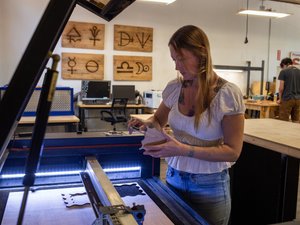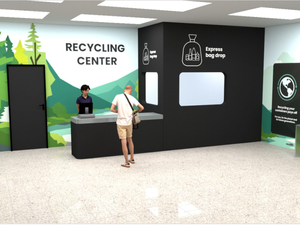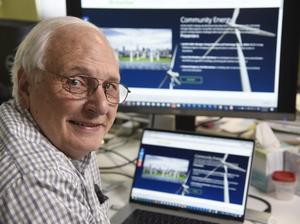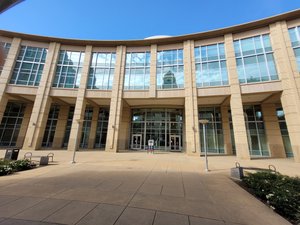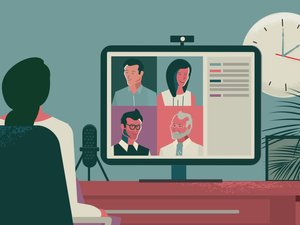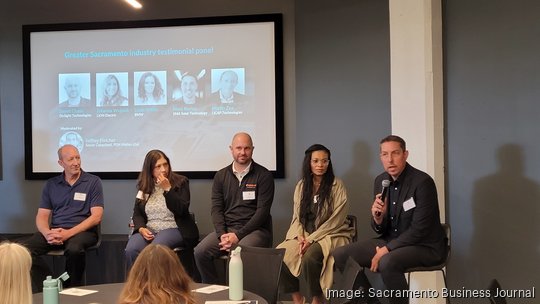
Sacramento region business leaders and regulators showed off how the capital region is eager to attract and support foreign companies to invest locally in clean technology to a delegation of foreign companies and investors.
The Sacramento event on Thursday was a SelectUSA Spinoff event focused on site visits by 83 mostly foreign investors in the U.S. in advance of the SelectUSA Investment Summit in Washington, D.C. next week hosted by U.S. Department of Commerce. SelectUSA is meant to facilitate business investment in the U.S. by foreign companies.
“Sacramento is the epicenter of a Northern California zero-emission innovation corridor,” said Hayden Kandul, business development project manager with the Greater Sacramento Economic Council.
“We are working to solve the problems of our lifetime with climate change and clean mobility,” said GSEC CEO Barry Broome.
Speakers included representatives of California State University Sacramento, University of California Davis, local cities and counties, locally grown technology companies, local manufacturers and the Governor’s Office of Business and Economic Development, or GO-Biz, among others.
The visitors spent the morning listening to panel discussions about local cleantech efforts and programs, industry testimonials and local talent and workforce development.
California has mandated that all new cars sold in the state must be zero-emission vehicles by 2035, with heavy trucks to follow in a few years and a zero-emission electric grid by 2045, said Gia Vacin, deputy director of ZEV market development with GO-Biz.
“These are some lofty targets,” Vacin said. The state has the largest percentage of ZEVs sold in the country, she said, adding that the conversion has a long way to go, and it may be a bumpy ride. She added that the state’s effort is working on four pillars to meet its goals, including working with industry on vehicles, developing the charging infrastructure, informing the public and developing an inclusive workforce.
With a presidential election looming, California will stay on track with its clean-energy goals no matter the outcome of the national election, said Maria Onorato, foreign direct investment project manager with GO-Biz.
“California stays the course,” Onorato said. “We are not going to shift track when it comes to zero emissions.”
It is important to stay abreast of Sacramento because the policies and regulations that come out of the Capitol, the Legislature and the California Air Resources Board dictate what will become standards, said Linda White, director of government and external affairs with BMW North America LLC in Sacramento.
“What happens in California doesn’t stay in California,” White said.
Regulations for emissions goals that California sets become standards that industry cannot ignore.
As far as talent, OnSight Technology CEO Derek Chase said Sacramento has supplied all the talent for the AI robotics company, with most of the C-suite executives graduating or being professors at Sacramento State and UC Davis.
“We are competing on a global level with a homegrown workforce,” he said.
Chase also said Sacramento’s entrepreneurial ecosystem is connected, which has supported his company from making prototypes to getting funding. He said he started out at the Growth Factory incubator, which then invested in the company, and then supported it in getting funding from Folsom-based venture capital firm Moneta Ventures. Those connections, in turn, allowed it to get the attention of Bay Area investors.
“The region is so connected, it is easy to get things done,” he said.
“We are here to make your life easier,” said Rosanna Herber, a member of the Sacramento Municipal Utility District board of directors. The utility is a home-grown effort that is now one of the largest municipal utilities in the country, and it got there by working to develop relationships and partnerships in its territory. She said SMUD’s rates are also 52% lower the investor-owned utilities that serve much of the rest of the state.
“We want to work with you,” Herber said.
A group of local stakeholders are working to expand the California Mobility Center to a 25-acre space at Sac State, which would include the engineering schools of both Sac State and UC Davis in clean mobility and battery technology. The idea was seeded by investments from SMUD, and its goal is to make Sacramento a center of clean mobility and technology by partnering with industry.
“People underestimate the importance of working with industry,” said Michelle Willard, chief of external relations with Sac State. Students are eager to work with industry developing new technologies because that is where the innovations are made real.
